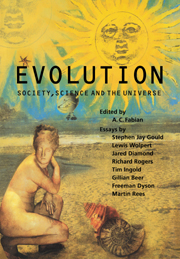Book contents
- Frontmatter
- Contents
- Introduction
- 1 On Transmuting Boyle's Law to Darwin's Revolution
- 2 The Evolution of Cellular Development
- 3 The Evolution of Guns and Germs
- 4 The Evolution of London
- 5 The Evolution of Society
- 6 The Evolution of the Novel
- 7 The Evolution of Science
- 8 The Evolution of the Universe
- Notes on Contributors
- Acknowledgements
- Index
5 - The Evolution of Society
Published online by Cambridge University Press: 25 January 2010
- Frontmatter
- Contents
- Introduction
- 1 On Transmuting Boyle's Law to Darwin's Revolution
- 2 The Evolution of Cellular Development
- 3 The Evolution of Guns and Germs
- 4 The Evolution of London
- 5 The Evolution of Society
- 6 The Evolution of the Novel
- 7 The Evolution of Science
- 8 The Evolution of the Universe
- Notes on Contributors
- Acknowledgements
- Index
Summary
Evolution
Many years ago I heard a lecture on evolution by a distinguished geneticist. Holding a stone in his hand, he observed that, were he to let it go, there was a fair degree of certainty that it would fall to the ground. With that, I am sure everyone in his audience agreed. It is equally certain, he then went on to declare, that species have evolved. This beguiling analogy has stuck in my mind ever since, for three reasons. First, declarations of certainty seem an odd place from which to start doing science. After all, it was only because Darwin refused to accept the certainty that species had been created to divine order that we have a theory of evolution at all. Secondly, I was put in mind of the objection lodged by Canon Kingsley, over a century ago, to the claim that there was a similar inevitability about the evolution of society. A dropped stone, Kingsley noted, would not necessarily hit the ground if someone decided to catch it. His point, of course, was that human freedom could not readily be comprehended within a framework of mechanical law. Thirdly, I was moved to reflect that had it not been for a colossal misunderstanding in the history of their subject, brought about through an uncritical extension of widely held ideas about social evolution to the organic domain, contemporary biologists would now be telling us that to believe that species have evolved is profoundly misguided.
- Type
- Chapter
- Information
- EvolutionSociety, Science and the Universe, pp. 79 - 99Publisher: Cambridge University PressPrint publication year: 1998
- 8
- Cited by

